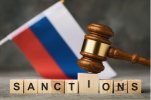- Date
- 2 March 2022
Deeper Dive: Western Sanctions on Russia
Deeper Dive: Western Sanctions on Russia
By Jake Rickman |
What do you need to know this week?
In light of Russia’s illegal invasion of Ukraine, Western powers including the EU, the US, and Canada have imposed substantial and unprecedented sanctions on Russia. The intent is to coerce the Russian government into ceasing military action and withdrawing from Ukraine.
The sanctions target important Russian leaders including President Vladimir Putin, foreign minister Sergei Lavrov, and all 351 members of the Russian Parliament, by freezing their assets held outside of Russia, such as bank accounts.
Sanctions have also been imposed on Russian businesses and the wider Russian economy: the flagship Russian airline Aeroflot is banned from UK and EU airspaces, while EU and UK businesses are prohibited from exporting materials to many Russian companies or buying their products.
In what is probably one of the more severe sanctions, several Russian banks have been booted from the international “SWIFT” banking system, which facilitates most international payments and effectively cuts them off from the global economy.
Why is this important for your interviews?
This is a fast-moving situation. It remains far too early to determine if the sanctions will achieve their intended effect, which is to grind the Russian economy to a halt and make it politically and economically untenable for Russia to continue its war against Ukraine.
The commercial impact of Russia's aggression is of far less importance compared to the many lives already lost and millions of people displaced. The magnitude of this event really cannot be overstated.
That said, this event is likely the single biggest external cause of concern for businesses that have any degree of exposure to the region.
The sanctions will have wide-ranging implications for any business that deals with the Russian economy. Businesses or individuals in breach of sanctions will face criminal liability. Additionally, given the near-universal denouncement of Russia’s action, firms that continue to trade with Russia will also face significant public scrutiny.
How is this topic relevant to law firms?
Sanctions have the force of law and can be worded in ways that businesses may struggle to interpret. Clients will want to know, for instance, what exactly constitutes the export of technology to targeted entities like JSC Kalashnikov, the small arms manufacturer. Law firms with recognised practices in export controls and economic sanctions can ensure businesses do not breach the letter of the law.
Law firms themselves must also be mindful of how sanctions affect their business. Not an insignificant number of transactional matters may involve high-profile “politically exposed” Russian individuals who are the targets of sanctions. Law firms must therefore conduct appropriate due diligence when onboarding clients to ensure they do not offend any sanctions.

